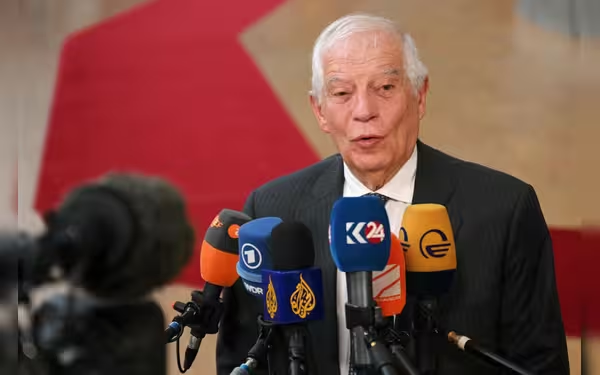Sunday, December 22, 2024 08:23 PM
EU Diplomat Josep Borrell Expresses Frustration Over Mideast Crisis
- Borrell has 'no more words' for Mideast suffering.
- Over 43,000 casualties reported in Gaza since October 7.
- EU's diplomatic relations with Israel remain intact despite calls for suspension.
 Image Credits: arabnewspk
Image Credits: arabnewspkJosep Borrell expresses frustration over the humanitarian crisis in Gaza, highlighting the tragic loss of civilian lives.
In recent times, the Middle East has been engulfed in a severe humanitarian crisis, particularly in Gaza, where the ongoing conflict has led to devastating consequences for civilians. The situation has drawn international attention, with various leaders and organizations calling for action and expressing their concerns. One such leader, Josep Borrell, the outgoing top diplomat of the European Union (EU), has voiced his deep frustration regarding the EU's response to the crisis during his tenure.
During a press briefing following a meeting of EU foreign ministers, Borrell stated that he had "no more words" to describe the suffering in the region. His remarks came as he delivered a grim assessment of the situation, highlighting the tragic reality that the majority of casualties in Gaza are children and women. He noted that the most common age among the victims is just five years old, emphasizing the dire circumstances faced by the innocent.
Borrell's comments reflect a broader sentiment of despair regarding the EU's inability to effectively address the Israeli-Palestinian conflict. Despite his calls for a suspension of political dialogue with Israel in light of the ongoing violence, most EU member states rejected this proposal. Borrell expressed his disappointment, stating that many countries believed it was more beneficial to maintain diplomatic relations with Israel.
The statistics surrounding the conflict are staggering. Since the outbreak of violence on October 7, 2023, the health ministry in Gaza has reported that over 43,000 people, primarily civilians, have lost their lives. In contrast, the Hamas attack on Israel resulted in the deaths of 1,206 individuals, mostly civilians as well. These figures paint a grim picture of the human cost of the conflict.
As Borrell prepares to step down from his role, he reflects on the challenges faced during his five-year mandate, particularly regarding the EU's response to the war in Ukraine. He expressed frustration over the EU's handling of the situation, suggesting that a stronger and more united response could have been beneficial from the outset. Borrell's comments serve as a reminder of the complexities of international diplomacy and the urgent need for a cohesive strategy in addressing global conflicts.
Looking ahead, the future of European diplomacy remains uncertain, especially with the potential re-election of Donald Trump in the United States and ongoing tensions in Ukraine. Borrell's call for Europe to take on its strategic responsibilities resonates strongly in this context. As the world watches the developments in the Middle East and beyond, it is clear that the need for unity and decisive action has never been more critical.
The situation in the Middle East is a stark reminder of the human cost of conflict. As leaders like Borrell step down, it is imperative for the international community to reflect on their roles and responsibilities in fostering peace and stability. The time for action is now, and the world must come together to address the suffering of those caught in the crossfire.













